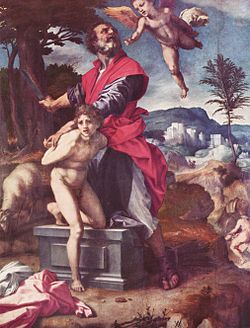First posted on Marxmail.
The old testament contains many, many strata, written at very different
stages, in extremely varied circumstances. It is a complex document that
cannot be easily resumed as "the triumph of private property and
patriarchy".
In fact, at its core, there is a certain tilting of the Old Testament
towards pastoralism, visible in the importance given to sheep and the
fact that Jews had to pay "compensation" for the lives of their sons by
sacrificing lambs (redemption through lamb sacrifice) "in exchange" for
a son :
Exodus 13:2 "Consecrate to me every firstborn male. The first offspring
of every womb among the Israelites belongs to me, whether man or animal.
And every first male thou shalt redeem with a lamb; and if thou wilt not
redeem it, then thou shalt break his neck: and all the firstborn of man
among thy children shalt thou redeem.
and it came to pass, when Pharaoh would hardly let us go, that the LORD
slew all the firstborn in the land of Egypt, both the firstborn of man,
and the firstborn of beast: therefore I sacrifice to the LORD all that
openeth the matrix, being males; but all the firstborn of my children I
redeem.
"
Hence the tradition of redeeming a male son with the sacrifice of a
lamb, which in modern judaism is merely symbolical.
This equivalence between lamb and first male son is thus deeply present
in Judaism and by extension Christianity ("Jesus is the lamb of God sent
to reddeem through his blood the sins of mankind").. It goes back to
very old practices among the pastoral tribes that would later be
amalgamted within the so-called "Israelites".
Of course, the Old Testament then goes on to give a spurious
"explanation" for such practices through the imaginary history of the
flight from Egypt, a narrative that provides an explanation for daubing
the door of the dwelling with lamb-blood (to ward of the spirit of the
Lord who comes looking for the first-born child), celebrating PAssover
(bitter herbs, lambs business, because of the great hast to escape the
PAhroah's army) and quite a few other, otherwise "unexplainable"
elements in Jewish folklore (ritual cleanliness for example).
The Old Testament thus contains a lot of evidence regarding the original
nature of the various "Jewish" tribes that came to Palestine from the
2nd millenium BC onward : they were pastoralists, whose mythology was
overwhelmingly centered around sheep-rearing and for whom the
lamb-conception season (easter) was of primordial importance. No triumph
of agriculture, but a very slow, and begrudging transition from pastoral
nomadism to settled cultivation.
The redeeming through a lamb instead of the sacrifice of a human babe,
the symbolical equivalence of lamb and male chile, the notion of
sacrifice (remember Isaac) is common to many pastoralist societies
around the globe. That it left an imprint so profound (through the idea
of "redemption" and eventually to that of Christ's "sacrifice") in later
re-writings of the Old Testament myths (6th to 3rd century BC, when the
inhabitants of Palestine were agriculturists and no longer nomads), is
proof enough of the persistence of Pastoral and nomadic motives in the OT.
So I wouldn't say that the OT is the triumph of Private property over
Pastoralism (which is quite Patriarchal by the way, the head of the
family being in complete control !), but rather the re-interpretation,
over several centuries, of Palestinian mythology and it's re-fitting
into an agriculturist society. Two millenia of lamb/first-born son
redemption (equivalence) symbolism still stubbornly refusing to adapt to
new conditions. Right into the 1century BC (or 20th century AD for that
matter). What more proof do you need that mythological/symbolical
structures are incredibly resistant to change, and persist long after
the mode of production that gave rise to them has ceesed to exist. The
old concepts they contain are still operative, even though the actual
content has long-ago vanished. And are still capable of being
incorporated (even create) new beliefs.


No comments:
Post a Comment